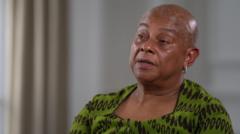Did Prince Harry Reveal He Was Hacked to Stephen Lawrence's Mum?

Published: 2025-09-12 16:14:09 | Category: technology
Baroness Doreen Lawrence has expressed her astonishment at being contacted by Prince Harry, who uncovered evidence suggesting that she had been spied on by the Daily Mail. This revelation comes as she joins Prince Harry and other high-profile figures in a lawsuit against the newspaper's publisher, Associated Newspapers, over allegations of illegal information gathering.
Last updated: 21 October 2023 (BST)
Key Takeaways
- Baroness Doreen Lawrence was shocked to learn about alleged spying by the Daily Mail.
- Prince Harry informed her of the findings while pursuing his own legal battles.
- The allegations include phone tapping and monitoring of bank accounts.
- Associated Newspapers denies all claims and maintains its position on responsible journalism.
- The case is set to be heard in January 2024, with several public figures involved.
Background on Stephen Lawrence's Case
Stephen Lawrence, an 18-year-old black teenager, was murdered in 1993 in a racially motivated attack in Eltham, south London. His death became a pivotal moment in British history, highlighting systemic racism and failures within the police force. The ensuing campaign for justice by his family, particularly his mother, Doreen Lawrence, has been relentless and has led to significant changes in British law and policing.
Allegations Against the Daily Mail
Baroness Lawrence's legal action against Associated Newspapers stems from allegations that the Daily Mail engaged in unethical practices to gather information about her and her family's fight for justice. These practices reportedly included:
- Phone tapping of her home line.
- Hacking into her voicemails.
- Monitoring her bank accounts and phone bills through private investigators.
The specifics of these allegations have emerged as the legal proceedings have unfolded, leading to a renewed focus on press ethics in the UK.
Prince Harry's Involvement
In a surprising turn of events, Prince Harry reached out to Baroness Lawrence after discovering her name repeatedly arising in his own legal inquiries. He revealed to her that he had come across information suggesting she had been subjected to surveillance. This prompted her to consult with legal experts who confirmed the allegations.
Baroness Lawrence described her initial reaction as one of disbelief. She has dedicated her life to seeking justice for her son and finds it unfathomable that anyone would resort to spying on her. "Why would anybody want to be listening to my calls, hacking into my phone?" she questioned, underscoring the emotional toll these revelations have had on her and her family.
Associated Newspapers' Response
Associated Newspapers has categorically denied the claims made against it, labelling them as "preposterous smears." The publisher asserts that it has robustly defended its journalistic practices and has denied any involvement in illegal activities related to phone hacking or surveillance. They argue that the stories in question were derived from legitimate sources and that the allegations lack a solid foundation.
Despite these denials, the High Court has not dismissed the case, which is scheduled for a hearing in January 2024. This ongoing legal battle places considerable pressure on the media outlet and has reignited discussions about press accountability in the UK.
The Broader Implications of the Case
This case is significant not only for Baroness Lawrence but also for the wider discourse on press ethics. High-profile figures like Sir Elton John, David Furnish, and actors Liz Hurley and Sadie Frost are also co-claimants, indicating a collective stance against invasive journalistic practices. Their involvement highlights a growing concern about the extent to which media organisations may go in pursuit of stories, often at the expense of personal privacy and dignity.
Baroness Lawrence's Perspective on Trust
Baroness Lawrence has articulated feelings of betrayal regarding the Daily Mail. Once a supporter of the publication, which had campaigned for justice for her son, she now feels her trust has been irrevocably damaged. "I don't trust them whatsoever. I don't trust them at all," she stated, reflecting the profound impact this situation has had on her and her family's ongoing struggle.
What Happens Next?
As the legal proceedings approach, the outcome remains uncertain. Baroness Lawrence has expressed a desire for the Daily Mail to issue a public apology, acknowledging the distress and trauma their actions have caused her family. This case is expected to set a precedent for how media organisations handle sensitive information, particularly regarding individuals who have suffered tragedies.
Conclusion
Baroness Doreen Lawrence's experience serves as a stark reminder of the challenges faced by those seeking justice in the public eye. The legal battle against the Daily Mail is not just about personal privacy; it is indicative of broader ethical issues within journalism. As the case unfolds, it will be crucial to observe how the legal system addresses these serious allegations and what implications they may have for the future of journalistic integrity in the UK.
FAQs
What are the main allegations against the Daily Mail?
The main allegations include phone tapping, voicemail hacking, and monitoring bank accounts related to Baroness Doreen Lawrence's efforts to seek justice for her son, Stephen Lawrence.
When is the case against the Daily Mail being heard?
The case is scheduled to be heard in January 2024 in the High Court in London.
Who are the other claimants in the lawsuit?
Other claimants include public figures such as Sir Elton John, David Furnish, Liz Hurley, Sadie Frost, and former politician Sir Simon Hughes.
What does Baroness Lawrence want from the Daily Mail?
Baroness Lawrence seeks a public apology from the Daily Mail for the distress and trauma caused by their alleged actions against her and her family.
How has the Daily Mail responded to the allegations?
The Daily Mail has denied all allegations, calling them "preposterous" and claiming that its journalism is based on legitimate sources.



